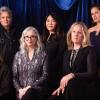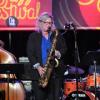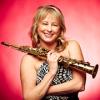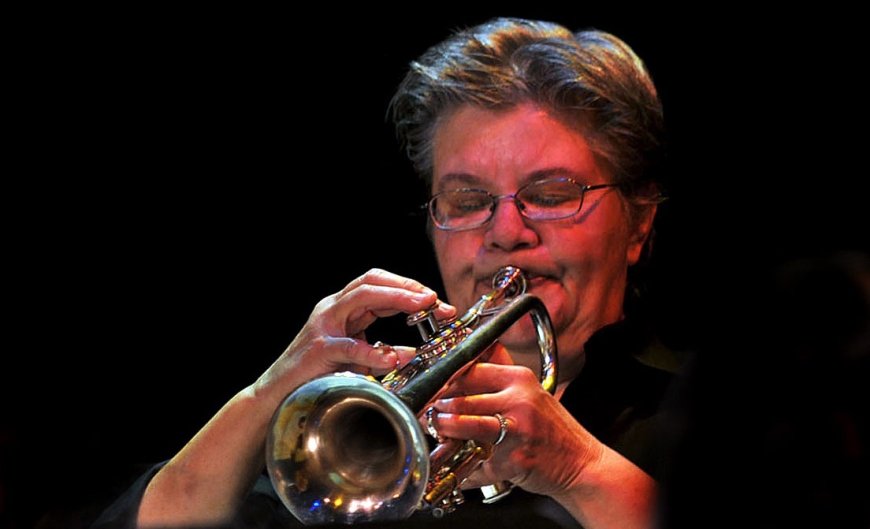
Jazz trumpeters can draw on a century-spanning constellation of role models, from Louis Armstrong, Dizzy Gillespie, and Miles Davis to Clifford Brown, Freddie Hubbard, and beyond.
But Bay Area trumpeter Ellen Seeling reached back even further in history — to the Book of Joshua — using her horn and voice to demolish the walls that have long kept women players from opportunities to advance their art.
Seeling’s death on May 26 at the age of 74 continues to reverberate, with memories, celebrations, and tributes coming in from all corners of social media, like a post from legendary producer and songwriter Nile Rodgers, who shared a photo of Seeling standing next to Luther Vandross that hailed her “the first trumpet in the Chic organization.” Earlier this year, she was named a Jazz Hero by the Jazz Journalists Association.
Seeling died peacefully from mesothelioma in the Pinole home she shared with her longtime partner, veteran saxophonist Jean Fineberg, who said that the condition was “probably caused by her working in a factory with asbestos between high school and college.”
Over five decades, Fineberg and Seeling toured and recorded with Laura Nyro, co-led several groundbreaking all-women bands, and worked on multiple fronts to advance the possibilities for women in jazz. Fineberg tended to work behind the scenes. Not Seeling.
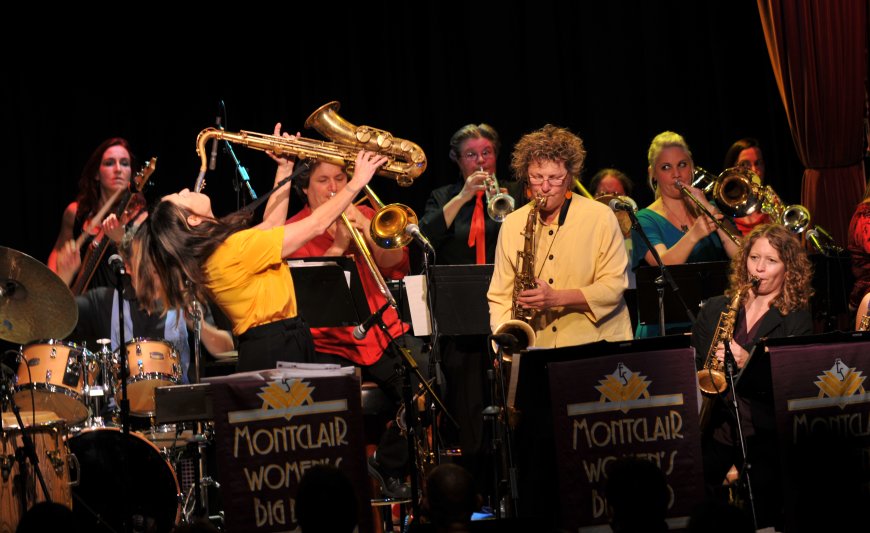
From Jazz at Lincoln Center to SFJAZZ to the Monterey Jazz Festival, the trumpeter challenged, upbraided, denounced, and ultimately sued major presenters that year after year failed to present women instrumentalists. She brought prophetic energy and a deep vein of outrage to the struggle, which has been vindicated in recent decades by the profusion of female bandleaders in the vanguard of 21st-century jazz.
A groundbreaking player from the beginning, Seeling was the first woman to earn a degree from the vaunted University of Indiana jazz program founded by David Baker. On the New York City scene in the mid-1970s, she more than held her own as the only female horn player in leading salsa and Latin combos led by such seminal bandleaders as Machito, Ray Barretto, and Mario Bauzá (who essentially invented Latin jazz in the 1940s with Dizzy Gillespie and Chano Pozo).
It was socially isolating, “but she never really said a lot about that,” Fineberg recalled. “I think she played that stuff so well [that] they hired her. She was exactly what they needed. They would often start at midnight and play until 4 a.m.”
Partly in response to the often uncomfortable gender dynamics in jazz, Seeling and Fineberg launched the all-women fusion band Deuce in New York and later the Bay Area. They would go on to co-direct the Montclair Women’s Big Band, a hard-swinging orchestra that played many leading venues while boosting the visibility of several rising players now thriving as bandleaders themselves.
For far too many years, there was a predictable rhythm to Seeling’s efforts. A major presenter would announce a new season, and she would blast the organization for once again neglecting female players. And woe to the person who noted that the roster in question included several women vocalists. She had nothing against singers, but Seeling, a trumpeter’s trumpeter, couldn’t abide seeing her sister players overlooked.
When the Jazz at Lincoln Center Orchestra checked in to the SFJAZZ Center for a four-night run in 2014, Seeling organized a protest over the lack of any women in Wynton Marsalis’s 15-piece ensemble. She became a lightning rod for the issue, attracting backers and detractors online, but she wasn’t fazed by the critics.
“It’s definitely hard knocks for me personally,” Seeling told me in an interview at the time. “You have not lived until you’ve been the only woman in a salsa trumpet section. It’s threatening to raise the issue. Why are there no women in that band? I don’t like people calling me names on the internet, but it’s not going to prevent me from doing what I’m going to do.”
The following year, working with New York attorney Sara Sanderson, Seeling filed a suit against Jazz at Lincoln Center for the band’s hiring practices. The parties ended up reaching a confidential settlement, and the orchestra came to hire saxophonist Camille Thurman for two years. Alexa Tarantino is now the sole female player in the ensemble.
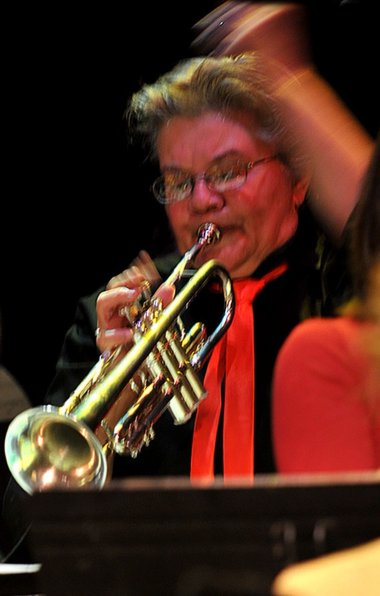
“At the height of her activism she was obsessed,” Fineberg said of her partner. “She did a tremendous amount of research into the numbers, looking back over years to pin down exactly how many women players were hired. I’m sure she lost gigs because of her protests. If Ellen lost them, she didn’t care.”
Seeling and Fineberg worked to create opportunities for girls as well as women, founding the Jazzschool Girls’ Jazz and Blues Camp, a summer program at the California Jazz Conservatory in Berkeley. Berkeley High Jazz Director Sarah Cline picked up the mantle and created JazzGirls Day, a program geared toward encouraging middle and high school girls to pursue jazz.
And then “Rebeca Mauleon started SFJAZZ Girls Day,” Fineberg said. “Jessica Jones started one in New York, and I’m sure there are others. We give Susan Muscarella at the Jazzschool a tremendous amount of credit. The Jazzschool had one youth camp. They had a ton of kids and only four girls. She gave us the go-ahead to create the Jazz and Blues Camp, and we got 30 girls the first year.”
Like many die-hard activists, Seeling didn’t have much patience for people who sought to work quietly. Pianist Tammy Hall spent about a decade holding down the piano chair in the Montclair Women’s Big Band, “an experience I’m grateful for,” she said. “It made me improve my sight-reading, and Ellen was a great advocate for us.”
But Hall also noted, “I certainly didn’t agree with the confrontational side of it, not even trying to sweeten the pot. To immediately put people on defense is not the way to go. But that was Ellen. She was so committed that women should never [again] be treated like in the 1940s and ’50s, when men came back from the war. Like Skip the Needle says, ‘We ain’t never going back.’”
Often lost amid Seeling’s activism is that fact that she was a consummate musician, Hall said. “Her trumpet playing was gorgeous, just velvety. I loved playing with her on ballads. That was a sweet spot for me. And it really softened her. Her musicianship and sensitivity to the music were really impeccable. She was one of the greats, and I wish she had gotten more acclaim for her work.”
Seeling and Fineberg met when low-brass legend Bob Stewart recommended Seeling for the suddenly empty trumpet chair in Isis, an all-female horn-powered rock band along the lines of Chicago and Blood, Sweat & Tears. When she showed up at Allen Toussaint’s New Orleans studio, it was not love at first sight-reading.
“We were an all-women band, these crazy rock-’n’-roll girls, totally nuts,” Fineberg recalled. “She was this straitlaced Wisconsin girl, and she didn’t like the way we played the horn section. She told us that they taught her in school that the trumpet is the leader and tried to tell us how to play. We didn’t fight, but we weren’t friends.”
Things warmed up once Isis hit the road, and Fineberg and Seeling became a devoted couple. When the studio scene in New York cooled off at the end of the 1980s, they relocated to the Bay Area. Seeling is survived by Fineberg and their daughter Eugenia, as well as her mother Charlotte, 94; sisters Marie, Karan, and Dotti; and brother David.


